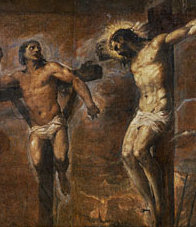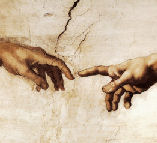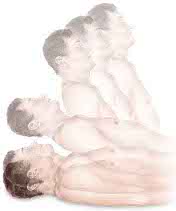If soul sleep is true, then why did Jesus tell the criminal on the cross that he would be with him that day in Paradise?
As I’ve indicated numerous times, I’m a materialist about human beings. I don’t think that I’m an immortal ghost/soul living inside a body. I think that I’m a physical creature. Long before I encountered philosophy of mind or neuroscience, I became convinced that this is what the Bible teaches, making its teaching on human nature stand out like a sore thumb against the pagan Hellenistic theology of the first century.
I also become convinced that since I am not an immortal ghost living inside a body, when my body dies I will not escape death and live on in heaven, or the underworld, or the astral plane or anything of that sort. I think the Bible teaches that death is very real and it puts an end to our life. There is no conscious state of any sort immediately following death. There is noting at all. Of course, I am a Christian and I do believe in the resurrection of the dead, but that obviously doesn’t happen when a person dies, or I think somebody would have noticed by now. The view I hold has sometimes been called “soul sleep” because it views death as a state of “sleep” or unconsciousness. It’s not an ideal term because it can be taken to imply dualism and maybe “person sleep” would be a better alternative, but it’s too late for that. The term has been coined.
Holding and expressing these views rubs some of my fellow conservative evangelicals the wrong way, but for the most part there’s really no disputing that the Bible presents human nature and death this way literally dozens of times in fairly clear language. Affirming dualism and the view that we live on as immaterial spirits after death and go somewhere is a point of view held in the teeth of the biblical evidence. This fact too, I suspect, rubs some of my fellow conservative evangelicals the wrong way.
In spite of the fairly clear overall teaching of the Bible, there is a very small handful of biblical passages (no more than four, in my view) that might be used (and have been used) to suggest that actually the general impression given by most of what the Bible teaches is false, and that really we do survive our bodily deaths and travel to heaven, or hell, or some other place and live consciously there. This should not be surprising. Whether you’re doing surveying, earth science or biblical interpretation, when formulating a theory you’re always going to be confronted with recalcitrant evidence, that is, evidence that at first glance seems to go against the flow of the well-established facts and is in need of an explanation. The existence of such evidence in science or in Scripture does not falsify a theory.
One of those texts is Luke 23:43.


 At last, the series ends. Here is part five of the series on the mind/body problem. This episode steps completely away from analytical philosophy and is an overview of some of the biblical material that bears on the subject. Although it’s a comparatively long episode (just under fifty minutes), it’s still a very sketchy overview. The subject is a large one, and at best I can get the ball rolling and encourage you to look further. Enjoy. 🙂
At last, the series ends. Here is part five of the series on the mind/body problem. This episode steps completely away from analytical philosophy and is an overview of some of the biblical material that bears on the subject. Although it’s a comparatively long episode (just under fifty minutes), it’s still a very sketchy overview. The subject is a large one, and at best I can get the ball rolling and encourage you to look further. Enjoy. 🙂 Here’s the fourth installment on my series on the mind-body problem.
Here’s the fourth installment on my series on the mind-body problem. Here’s part three of the series on philosophy of mind. We’ve moved from dualism in part one through to physicalism in this episode. I look at epiphenomenialism, reductionism, nonreductive physicalism and a constitution view.
Here’s part three of the series on philosophy of mind. We’ve moved from dualism in part one through to physicalism in this episode. I look at epiphenomenialism, reductionism, nonreductive physicalism and a constitution view. Here it is, part two of the series on philosophy of mind, In Search of the Soul. In this episode I introduce the viewpoint called emergentism, and I explore the argument for dualism from free will.
Here it is, part two of the series on philosophy of mind, In Search of the Soul. In this episode I introduce the viewpoint called emergentism, and I explore the argument for dualism from free will. In this episode of the Say Hello to my Little Friend podcast I start a four part series on philosophy of mind. I know I recently said that it would be a three part series, but hey, even four parts isn’t really enough to give the subject the full treatment it deserves. In part one I start with the dualist end of the spectrum. Today it’s Cartesian/Platonic dualism, which I take to be the most popular variety.
In this episode of the Say Hello to my Little Friend podcast I start a four part series on philosophy of mind. I know I recently said that it would be a three part series, but hey, even four parts isn’t really enough to give the subject the full treatment it deserves. In part one I start with the dualist end of the spectrum. Today it’s Cartesian/Platonic dualism, which I take to be the most popular variety.